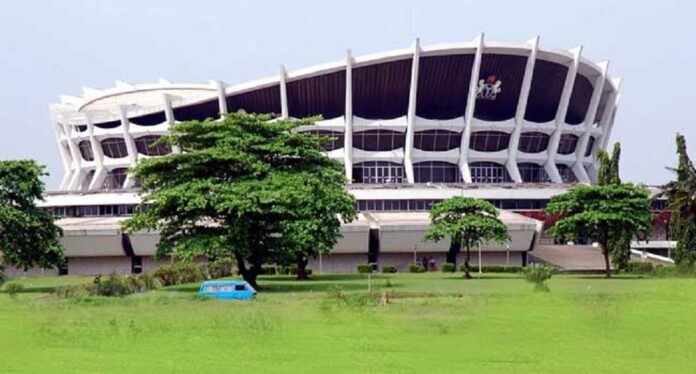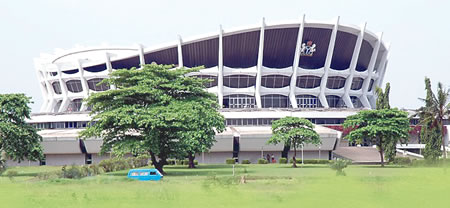AUTHORITIES of the National Theatre have confirmed that residents of Lagos State currently make a living operating fun spots and relaxation joints on the premises of the premier theatre centre would soon be ejected to give way to a hotel, which will be part of the takeover by Nigerian bankers who were recently handed the edifice in a partnership deal with the Federal Government.
Public Relations Officer of the theatre, Steve Ogundele, exclusively told Saturday Tribune that the plan of the Federal Government was to turn the theatre into an entertainment city. He disclosed that the present relaxation spot where the popular fun spot, Abe-Igi Arena, is situated, is the proposed site for a hotel, which has made it compelling for relaxation spot operators and other traders to vacate the premises.
He said: “The handing over on Sunday has put rumour of selling the National Theatre to rest. The Federal Government has given approval to the Central Bank of Nigeria and the Bankers’ Committee to revamp and develop existing structures and the fallow land. This has put a stop to the rumoured privatisation of the edifice which upon completion would include four hubs of film and music; hubs for film and music productions from start to finish, a computerised fashion hub where film industry can be complemented, a welcome house which is a kind of reception where visitors to the theatre will lounge before going to the cinema hall and an IT hub where information technology facilities are installed for the use of the public.
“These make room for healthy competition and a healthy development for both the staff and visitors to the facility and the development of the cultural centre. It is going to be to the benefit of all stakeholders. Why did I say that? This is a free-market economy. Why we are looking at that is because this is owned by the government and everything is being controlled by the government and it is supposed to be subsidised. But I can tell you that this edifice is still in the hands of the Ministry of Information and Culture and the board and management of the National Theatre. Therefore, nothing will change in the running of the theatre, although its use might attract some extra cost because of the modern technology that is going to be installed. The main national theatre is not going to run as a profit-making venture.
“It is not going to be run by the CBN and the Bankers’ Committee. What they get is just the hubs where they are going to get back the money they invested. So, if you are going to patronise the hub, you have to pay. But for movie practitioners and other artistes, well, it might be subsidised. This is PPP and the private part of the arrangement has nothing to do with the government because that is where they are going to make back the money they invested on the project. It still has to be pocket-friendly but they also have to know that people from outside the country will be patronising us as well. We go to South Africa to shoot and edit. We go to London to shoot and edit and we pay in foreign currency. So, when these people come to Nigeria to shoot and edit, are they going to be paying a pocket-friendly price, too? No!
“But of course, there is going to be some level of understanding between us and the hubs for them to know and identify our members for consideration. There could be some level of price differentiation that would favour stakeholders within the country, compared, to external persons but we cannot determine what price is going to be paid on services. What you probably don’t know is that the National Theatre has a master plan. This is coming into play in this PPP arrangement because it will attract more investors that are coming in to complete the master plan arrangement which include car park, shopping mall and a five-star hotel and a water garden and the rest of them.”
Mosunmola Amidu, a retailer at the popular relaxation spot located within the premises known as Abe Igi Arena, said the upgrade of the edifice is farewell to her cool-spot business which was handed over to her by her mother. Amidu was sitting with her friend at the front entrance of her relaxation spot ruminating on the way out of the renovation quagmire when Saturday Tribune walked up to them to share their thoughts on the new development. “It is as if you were reading our lips when you were walking towards us. The question you asked was the subject of our discussion” the duo exclaimed.
Amidu explained further: “The truth is that I doubt if we will be retained here. I know that once the National Theatre is upgraded to international standard with modern facilities, architecture and lightings, definitely, this kind of setting (referring to her relaxation spot) will no longer fit in. I am sure plan for the construction of a five-star hotel, modern relaxation spot and shopping mall would be included in the new design. When it eventually commences, we will be thrown out of the premises. I have been trading here for over 40 years. I took over the business from my mother. I think the best the government could have done is to relocate us to avoid the negative effect of such upgrade which is job loss.
“For me, I don’t want to be caught unawares and as such, I have been thinking of a way out. But if God says we are still going to be earning our daily bread here, the government would retain us but if not, we just have to move on. Even before the planned renovation, the COVID-19 pandemic has drastically affected our sales. It is not booming as when national theatre was in its glory days. Back then, on a normal day, National Theatre was fun seekers’ first choice. I would drive in and collect N20,000 to entertain myself but now I dare not remove N2,000 from the daily sale. That tells you how bad things have become. This is further complicated by the low productivity level of the National Theatre because when it was operating at maximum level, the patronage level was high.”
Traders, artists should be relocated, not evicted –Rights advocate, Onifade
He said: “Many of these art veterans are old and they rely on proceeds from their studios to feed but if they are sent away, what becomes of them and their trade? So, I think the government should resettle them. And this is not about the traders and artists alone; there is a Universal Studio for visual artists located within the National Theatre.
It will be completely out of place if the Universal Studio is dislodged because it has been there since 1982. It is part of the history of the National Theatre. They trained young Nigerian artists right from when they were in school. Some came for industrial training for their higher education while some came in as apprentices. It has contributed immensely to the growth of visual art sector in the country and cannot just be dislodged. As a matter of fact, I think the Bankers’ Committee should restructure the Universal Studio to generate income, even for the government by the time the edifice takes off. It is not possible to go to a stadium without finding footballers around. So, how can you go to a national theatre without finding artistes around? That will be a misjudgment of intention.”
Onifade disclosed that the upgrade of the national monument and siting of entertainment hubs would generate income for the government and even the tourism potential of the state. He, however, advised the government on the need to subsidise and balance its relationship with theatre practitioners.
He said: “There was a period the National Theatre was shut down during the time of Kabir Yusuf. During his tenure, artistic activities were shut down. At that time, industry players like theatre practitioners and fine artists had to look for alternative venues. Luckily, at that time, because the Freedom Park had emerged, a lot of them were directed to the Freedom Park. At the same time, theatre practitioners sought alternative venues. What I am trying to say is this, once the theatre is handed over to the government, they will have to devise means to run it and also balance the relationship with theatre practitioners.
In truth, mismanagement by government has led to the degeneration the edifice is currently battling. Thankfully, they are now subjecting it to restoration but after the restoration, expectedly, everything will change. You cannot want to use the National Theatre and be expecting to pay the amount being paid before the renovation. No, there must be a pay rise. When you go to a place like MUSON Centre, you will find a corporate environment with adequate security and all that but this is not so at the theatre. But by the time the renovation is completed, it is going to be turned to a corporate environment where security will be beefed up and the atmosphere will now compete or surpass existing one. With this done, you can’t expect the government to be charging peanuts on facilities.
“For me, what the theatre practitioners should be talking about is a kind of collaboration with the government on price reduction or discount. These are the things that happened in the 70s and 80s, when all the halls were engaged. It was not like the practitioners of the time had enough to pay for the halls. But it was because of the collaboration that had existed between the practitioners and the management of the theatre.”
Tribune



